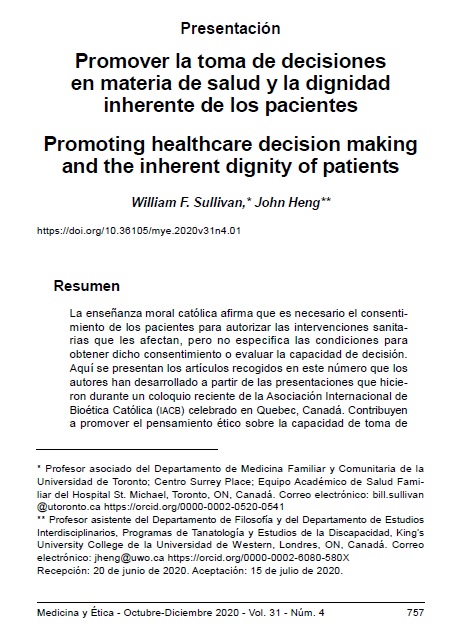Promoting healthcare decision making and the inherent dignity of patients
Main Article Content
Abstract
Catholic moral teaching affirms that the consent of patients is necessary to authorize healthcare interventions affecting them but does not specify conditions for obtaining consent or assessing decision-making capacity. This article reviews papers in this issue that authors have developed from presentations they made during a recent International Association of Catholic Bioethics (IACB) colloquium held in Quebec City, Canada. These papers contribute to advancing ethical thinking on decision-making capacity and consent. In various ways, they call for respecting the dignity of allpatients by promoting their participating as much as possible in making healthcare decisions. These papers consider decision making to be relational and to encompass a range of capabilities. They examine the role of family members and other decision-making supporters in promoting the capabilities of patients whose mental health condition or disability renders them unable often to meet typical clinical and legal standards for decision-making capacity.
Downloads
PLUMX Metrics
Article Details

This work is licensed under a Creative Commons Attribution-NonCommercial-ShareAlike 4.0 International License.
Medicina y Ética is distributed under a Creative Commons License Atribución-NoComercial-CompartirIgual 4.0 Internacional.
The author keeps the property rights with no restriction whatsoever and guarantees the magazine the right to be the first publication of the work. The author is free to deposit the published version in any other medium, such as an institutional archive or on his own website.
References
2 Sullivan WF, Heng J, DeBono C, et al. Promoviendo la capacidad de tomar decisiones sobre el cuidado de la salud. Declaración de consenso del 9º Coloquio Internacional de la IACB. National Catholic Bioethics Quarterly. Verano del 2020; 20(2): 617-633. https://doi.org/10.16925/greylit.1514
3 Welie JVM. Agenciamiento del paciente, autonomía y consentimiento. Medicina y Ética. Octubre de 2020; 31(4).
4 Taboada P. Una vida para la Bioética. Homenaje al cardenal Elio Sgreccia (1928-2019) tras su muerte. Medicina y Ética. Octubre de 2020; 31(4). https://doi.org/10.4081/mem.2016.479
5 Sgreccia E. DiCamillio JA, Miller MJ, traductores. Bioética personalista. Fundamentos y aplicaciones. Filadelfia, EE.UU. The National Catholic Bioethics Center; 2012. Citado en Welie JVM. Agencia del paciente, autonomía y consentimiento. Medicina y Ética. Octubre de 2020; 31(4).
6 Hughes JC. Cuestiones éticas que se plantean en la toma de decisiones en materia de atención de la salud de las personas que viven con demencia y otros trastornos cognitivos progresivos. Medicina y Ética. Octubre de 2020; 31(4). https://doi.org/10.35537/10915/5429
7 Welie SPK. Defensa de los pacientes psiquiátricos en los Países Bajos: El modelo de la Fundación Nacional Holandesa de Defensores del Paciente en el Cuidado de la Salud Mental. Medicina y Ética. Octubre de 2020; 31(4). https://doi.org/10.4067/s1726-569x2012000200006
8 Elia CD. Cuestiones morales subyacentes a la orientación pastoral y la práctica sacramental para pacientes que eligen el suicidio o la eutanasia asistida: el dilema canadiense. Medicina y Ética. Octubre de 2020; 31(4).
9 Wilhelm K. Decision making in mental health care: the caregiver’s role. Medicina y Ética. Octubre de 2020; 31(4).
10 Thiel M-J. Rechazar y retirar el tratamiento al final de la vida: Complejidades éticas que implican a los pacientes que carecen de capacidad de decisión. Medicina y Ética. Octubre del 2020; 31(4).

